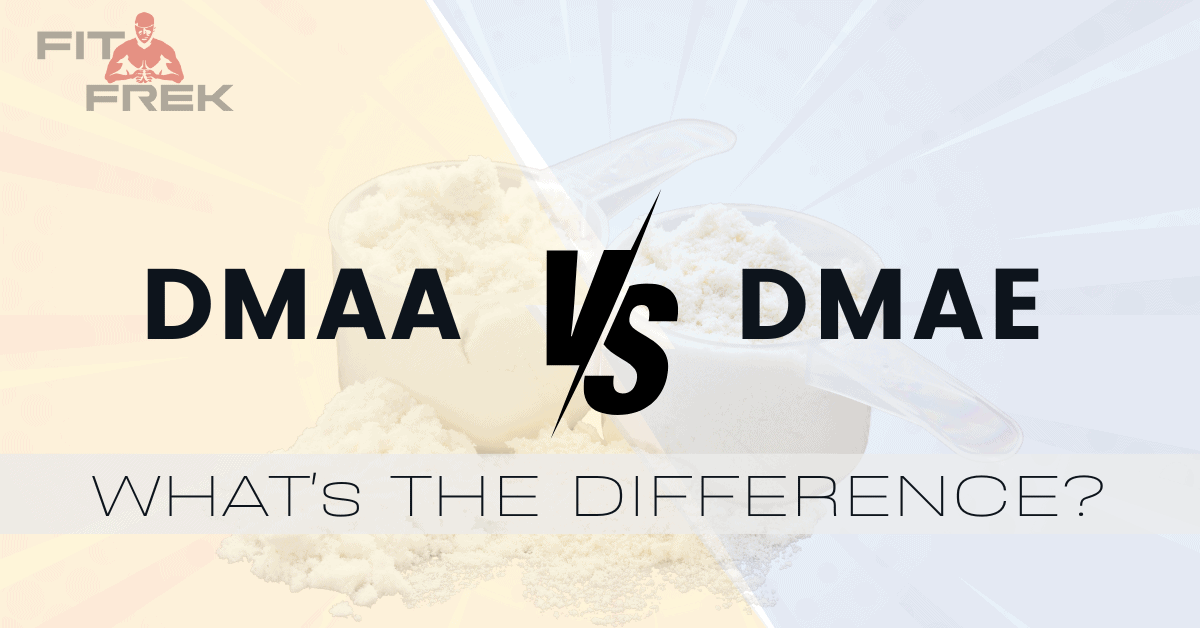






DMAE and DMAA are two acronyms that sound similar but represent two very different substances.
This article will dive into the benefits, potential side effects, and comparisons of these substances.
DMAE (Dimethylaminoethanol): Found in various skincare products, DMAE has been studied for its potential mental health benefits.
DMAA (1,3-Dimethylamylamine): This dietary supplement ingredient is commonly used in sports nutrition products for its stimulant effects.

Dimethylaminoethanol (DMAE) is known as a cognitive health compound.
It reduces the buildup of 'age pigment,' which impairs cognitive function and is linked to cognitive decline with age.
DMAE increases acetylcholine levels, which is crucial for memory improvement.
It has been shown to reduce beta-amyloid buildup, a compound associated with brain aging.
Uses Of DMAE
DMAE is studied for its potential benefits in both skincare and mental health.
DMAE In Skincare Products
DMAE is often used in skincare for its anti-aging benefits, helping to tighten and smooth the skin, thus reducing the appearance of fine lines and wrinkles.
DMAE For Mental Health Conditions
Beyond skincare, DMAE has been researched for its potential mental health benefits. Some studies suggest it may improve mood and mental clarity, making it relevant for conditions like depression, ADHD, Alzheimer's disease, and autism.
Benefits Of DMAE
Side Effects Of DMAE
Like any supplement, DMAE can have side effects, usually mild and self-resolving. Potential side effects include:
DMAA, or 1,3-dimethylamylamine, is a potent central nervous system stimulant often found in pre-workout supplements and fat burners.
It's known for its ability to increase energy, focus, and endurance, making it a favorite among athletes and bodybuilders.
However, DMAA is not without its controversies. It has been linked to serious health risks, including heart attacks and strokes.
The FDA has issued warnings about its use, and it is banned in several countries.
You can read more about the safety, benefits, and side effects of DMAA here.
Recommended: FDA-Approved Safe Pre-Workouts
Benefits Of DMAA
The primary benefit of DMAA is its ability to enhance physical performance.
It does this by increasing the release of dopamine, a neurotransmitter that plays a key role in motivation, pleasure, and motor control.
This can lead to improved focus, energy, and endurance during workouts.
In addition to its performance-enhancing effects, DMAA can also aid in weight loss.
It has thermogenic properties, meaning it can increase your body's metabolism and fat-burning potential.
This makes it a popular ingredient in many fat burners.
However, it's important to note that while these benefits can be appealing, they come with significant risks.
The use of DMAA has been linked to serious health problems, including heart attacks and strokes.
As such, it should be used with caution and under the supervision of a healthcare professional.
While DMAA can provide significant performance-enhancing benefits, it also has many potential side effects. These can range from mild to severe and include:
It's important to note that while these side effects are potential risks, they do not occur in all users.
However, given the serious nature of some of these risks, it's recommended that DMAA be used with caution and under the supervision of a healthcare professional.
While DMAE and DMAA may sound similar, they are very different substances with distinct uses, benefits, and risks.
Effectiveness And Potency
When it comes to effectiveness and potency, DMAA is often considered the stronger of the two.
Its stimulant properties provide significant boosts in energy and focus, which can enhance physical performance.
However, this increased potency also comes with higher risks and more severe side effects.
DMAE, on the other hand, is primarily known for its cognitive benefits.
It helps improve memory and mental clarity without the intense stimulant effects of DMAA.
This makes DMAE a safer option for those looking to enhance cognitive function without the risk of severe side effects.
Safety And Legal Status
In terms of safety and legal status, DMAE is generally considered safer and is legal in many countries.
It is widely used in both skincare products and supplements without major regulatory issues.
DMAA, however, has been associated with serious health risks, including heart attacks and strokes.
Due to these risks, the FDA has issued warnings against its use, and it is banned in several countries, including the United States.
Choosing Between DMAE And DMAA
The choice between DMAE and DMAA depends largely on individual needs and health status.
For those seeking cognitive benefits and improved mental clarity, DMAE is the preferred choice due to its safety and effectiveness in these areas.
However, for individuals looking for a potent stimulant to enhance physical performance, DMAA may be considered but should be used with extreme caution and under medical supervision.
Here, we'll answer some of the most common questions about DMAE and DMAA, including their uses, benefits, side effects, and more.
What is the difference between DMAE and DMAA?
DMAE (Dimethylaminoethanol) is a precursor to the neurotransmitter acetylcholine and is known for supporting brain health and mood. DMAA (1,3-Dimethylamylamine) is a dietary supplement ingredient commonly used in sports nutrition products as a stimulant.
Is DMAE a stimulant like DMAA?
No, DMAE is known to support brain health and mood but does not act as a stimulant like DMAA.
What are the benefits of DMAE?
DMAE is believed to increase the production of acetylcholine, a compound involved in memory. It has also been studied for potential benefits in treating depression, ADHD, Alzheimer's disease, autism, and tardive dyskinesia.
What are the benefits of DMAA?
DMAA is used in sports nutrition products as a stimulant to promote focus and increase energy.
Are there any side effects of DMAE?
While DMAE is generally considered safe, some people may experience side effects such as constipation, itching, headache, drowsiness, insomnia, excitation, vivid dreams, confusion, depression, increased blood pressure, and exacerbation of schizophrenia symptoms, and unwanted movements of the face and mouth.
Are there any side effects of DMAA?
DMAA can potentially cause a range of side effects, including high blood pressure, shortness of breath, chest pain, stroke, and psychiatric disorders.
Can DMAE and DMAA be used together?
It's not recommended to use DMAE and DMAA together without the advice of a healthcare provider due to the potential for side effects and interactions.
What are some alternatives to DMAA?
There are several alternatives to DMAA that are safe, legal, and effective, including Teacrine, Dynamine, and Higenamine HCL.
Is DMAA banned?
Yes, DMAA has been banned by the FDA due to serious safety concerns.
What is DMHA and how does it compare to DMAA?
DMHA, like DMAA, is a stimulant and is found naturally in the bark of the walnut tree. Unlike DMAA, it is also manufactured synthetically.
DMAA is a powerful stimulant that can enhance physical performance and aid in weight loss.
However, it also comes with significant risks, including the potential for serious health problems like heart attacks and strokes.
On the other hand, DMAE is a nootropic compound used to enhance cognitive function.
It does not have the same stimulant effects as DMAA and is generally considered safer.
However, like any supplement, DMAE should be used responsibly.
Before starting any new supplement regimen, it's essential to research and understand the potential risks.
Consulting with a healthcare professional is always recommended.



Useful Links
 About FitFrek
About FitFrekFitFrek operates as an independent platform, offering comprehensive workouts, programs, routines, guides, and unbiased reviews to accelerate your progress. We pride ourselves on our honesty, delivering straightforward and candid insights. FitFrek does not offer medical advice, diagnosis, or treatment services.